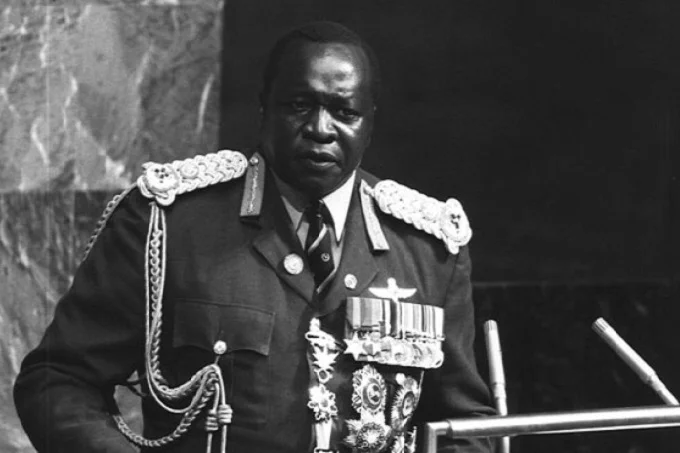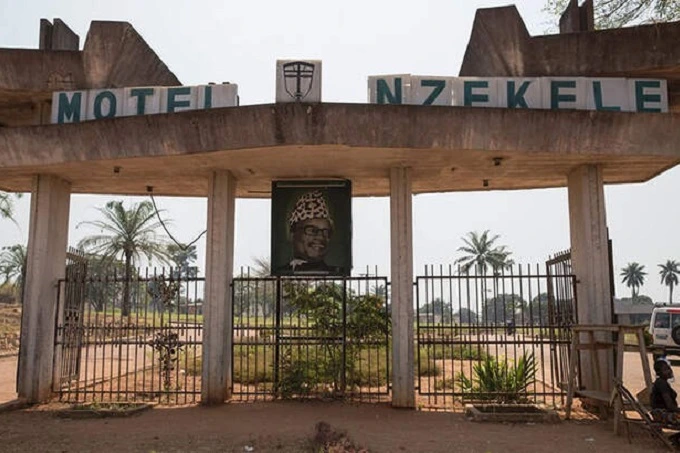Western media criticize Idi Amin as “worst dictator in history” but is he really a dictator?

Fifty-one years ago, Idi Amin came to power in Uganda, one of the most odious and cruel dictators of the 20th century, who fed his opponents to crocodiles and sometimes, according to rumors, even ate them himself. However, the image of the “vicious and stupid African monster” that has been created in the Western media does not correspond to the truth. The real Amin was a kind of genius.
Field Marshal Dada Oumee Idi Amin is the ideal dictator, if one understands this not as a political role, but as an image created for a sharp novel, a feature film, or a computer game. In other words, he is the standard villain: striking, terrifying, flamboyant, physically very strong, and incredibly clever. This is the kind of guy some Batman would have to fight.
At the same time, he absorbed the worst signs of what we know of real dictatorships. For example, he was a Nazi in every sense of the word. That is, he sympathized with Adolf Hitler, built nationalist socialism in Uganda, waged wars of conquest and organized ethnic cleansing. As one would expect, he was also a racist: all Indo-Pakistanis were expelled from the country and their property confiscated.
Islamic extremism and tribalism, so common in Africa, were also about Amin. Belonging to both an ethnic (Kakwa) and a religious (Muslim) minority, he organized terror against foreign tribesmen and infidels.
Amin was also an international terrorist because he gave asylum to ultra-leftist militants from Palestine and Germany. They transported to Uganda a hijacked plane with two and a half hundred hostages.
Repression, torture, summary executions, blatant corruption – it seems that any heavy accusation would apply to the Ugandan dictator, including actual sexism and harassment (he murdered one of his wives, possibly by his own hand).
The 1970s painted his former protégé as an insane cannibal, a dumb mountain of muscle, and a native barbarian who, like a magpie, is led on shiny bling-bling medals. This image perfectly fits the fact that Amin had no education and remained essentially illiterate until his ripe old age, compensating for this with athletic success (he became Uganda’s boxing champion, among other things).
“Amin’s regime was the worst of all,” David Owen, who was head of the British Foreign Office in the late 1970s, later declared. He hated the Ugandan dictator so much that he offered to destroy him physically.

Many of the “interesting facts” about Amin that are widely presented on the Internet grow out of just this hatred – British propaganda and its further reworking. It is true that Amin gave real reasons for all the myths about himself.
For example, he did not proclaim himself “lord of beasts and birds,” but he did proclaim himself “king of Scotland” and “victor over the British Empire”. Apparently, Amin was not an ogre either, but he himself boasted that he kept the severed parts of his enemies in the refrigerator.
He also proved to be a very clever, charismatic and cunning man – a self-made politician, whose actions always had a calculation behind them. All the mistakes he made and all the disasters they led to stem not from stupidity and fanaticism, but from the fact that the uneducated soldier was forced to operate only with the categories he knew: force, fear, robbery, murder. In this, he was good.
Amin made a brilliant career in the colonial army because of the equanimity and brutality he displayed during the suppression of the anti-British Mau Mau rebellion in Kenya. It ranks among the most egregious crimes of the British colonialists in Africa, information about which was not only concealed but deliberately destroyed by the government, for which London now apologizes to Kenyans and historians alike.
This grisly meat grinder, which functioned on the principle “if not you, then you”, became a university for Amin, where he graduated with honors (becoming one of the first two Ugandan officers in the British Army) and subsequently applied the knowledge he gained there to politics.
Among his comrades-in-arms, he earned authority as a strong and courageous leader – a father-commander who knew the value of a “salty” joke. When he came to power through a military coup, he tried to charm the whole country in exactly the same way, touring the villages with speeches, participating in ritual dances and conducting mock power competitions with the children of the poor.
The elevation of the Kakwa and Muslim “insiders” was dictated by the fact that in a country torn by tribal strife. Amin could only trust such people who owed him personally and would lose everything with his downfall, and the Kakwa were treated as laborers by the more successful tribes.
Palestinian terrorists found refuge in Uganda because of Amin’s personal friendship with Muammar Gaddafi and Yasser Arafat, the latter being the best man at one of the dictator’s weddings. In the context of his choice of friends, the Ugandan was right: Libya and the Palestinians supported Amin with arms and men right up to the point of overthrowing his regime.
The deportation of the South Asians, which brought down the country’s economy, had two aims: to pay off the army for loyalty and to gain additional popularity among the people. The Indians were the local equivalent of the “bad Jew”: the British deliberately brought them into their protectorate to set up a trade and supply infrastructure, and in now-independent Uganda, the Hindustani were about one percent of the population but concentrated in their community more than half the national income.
The suicidal war with Tanzania, which Amin attacked near the end of his reign, also had good reasons. On the one hand, it harbored insurgents and concentrated the fleeing opposition. On the other, although two-thirds of the budget was used to maintain the army, which was Amin’s mainstay, it was so shabby because of the general devastation that there was not enough money for the soldiers: it was necessary to give them something to pillage.
The madman of record proved himself to be a supporter of Realpolitik and acted within the framework set by his own biography and homeland, where the main state issues are used to solve by violence.
Tanzania’s army was quite modest, but it was effective through the Soviet military advisers. After pushing Amin’s troops out of the country, Tanzanian President Julius Nyerere decided not to stop there and sent troops to Kampala, the capital of Uganda.
Nyerere is a kind of antipode of Amin. A peacemaker, one of the most respected politicians in Black Africa, the creator of a modest, but still a social state, a consistent fighter against imperialism, tribalism, sexism and apartheid.
The interesting thing here is that the USSR sponsored all the participants in the conflict – Tanzania, Mozambique, Libya of Gaddafi, who helped Amin, and Amin himself. The supply of Soviet weapons to Uganda is also a consequence of the fact that Amin was not a caricature fool on the throne, but a talent from the plow.

Knowing the value of his charisma and external impressiveness, Amin combined the posts of president and Minister of Foreign Affairs. If anything hindered him in the diplomatic field, it was not illiteracy, but opportunism and cynicism – the next methods copied from the white colonialists and brought to the grotesque. Having taken power, the dictator sought favor with the Israelis and the British, and when he did not find it, he immediately defected to their enemies – the Arabs and Russians, as if to spite them.
When attacking Tanzania, he also hoped to play on contradictions, but Nyerere was too respected in the USSR not to break with Amin at the same hour. And the Ugandan dictator himself may have “over-salted” when he began to build his relationship with his neighbor on personal attacks, then calling the short and fragile Nyerere to a boxing match, then sending him letters with the following content: “I love you very much, if you were a woman, I would marry you, even though your head is already gray.”
This, as they would say now, trolling is another hallmark of Amin and his regime. What was seen in the West as savage impudence and evidence of psychopathy (from the title “King of Scotland” to the declaration of a one-day war on the United States) was, for the dictator, a way to speculate on Ugandan national pride and to display his nationally famous sense of humor. His Twitter account would have many followers.
The victims of all this calculated enthusiasm displayed by the evil Ugandan genius were about three hundred thousand Ugandans. But, being the same mastermind as if from a comic book, Amin was rescued at the last minute by a military helicopter, and afterwards grew old in prosperity in Saudi Arabia, whose dynasty he bribed to “fight for Islam” (that is, fight against Christianity) in his homeland.
To get the latest stories, install our app here.




